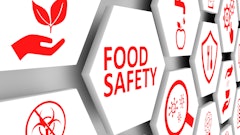
Set against the backdrop of recent food-contamination incidences including the Peanut Corp. of America (PCA) tragedy that claimed nine lives and sickened hundreds more people, Congress recently passed HR 2749—the Food Safety Enhancement Act of 2009 (FSEA).
The PCA debacle, the largest recall of food products ever in the history of the country, stemmed from salmonella poisoning of peanut butter the company manufactured. “Consumer confidence had been shaken and Congress felt it had to act,” explains Michael Sansolo, a Washington-based industry consultant and former senior vice president of the Food Marketing Institute (FMI).
But do some provisions reflect a knee-jerk reaction? Many in the food logistics industry feel that Congress should put the brakes on the movement of this resolution, which is on a fast track to passage. Once the Senate version (S-510) passes, the House and Senate bills will move to a conference committee, where the final bill will be written.
“We are concerned over attempts to rush legislation through Congress without the proper vetting and consideration relating to the impact such onerous regulation would have upon our small business community, especially during this economic slump,” cautions Anne Holloway, vice president of government affairs for American Wholesale Marketers Association (AWMA) in Fairfax, VA.
Concerns over the resolution include additional fees, operational costs and harsh monetary penalties; increased recordkeeping; and a one-size-fits-all approach to liability that could disproportionately impact some companies along the supply chain, especially companies whose responsibility is limited to storing and moving the finished goods. Some provisions would not even contribute to the overall goal of food safety, note contenders of specifics within the bill’s language.
So how exactly will food distributors be impacted? To find out, we asked AWMA, FMI, the Grocery Manufacturers Association (GMA), the International Foodservice Distributors Association (IFDA) and the International Warehouse Logistics Association (IWLA).
Understanding The Food Supply Chain
Many concerns exist in the industry because of Congress’ apparent limited understanding of the food supply chain and the differing roles and associated liabilities of companies along that long and complex chain.
“They view the supply chain as if there are only two players—the shipper and the receiver,” states Joel Anderson, president and CEO of Chicago-based International Warehouse Logistics Association. “They don’t understand there are many others involved in the movement of food products, including truckers, warehouses, brokers and retailers.”
This limited understanding resulted in the bill’s unfair stance regarding the extent to which a particular company is liable. Contenders maintain liability should reflect a company’s ownership and knowledge of product makeup.
AWMA, IFDA and IWLA, disproportionately and negatively affected by the bill, are working assiduously to have the language changed to reflect their respective limited liabilities. While AWMA and IFDA are food distributors and IWLA is a 3PL, the bill would subject each of them to penalties for not complying with activities that are not within the scope of their respective responsibilities. Both GMA and FMI support the bill.
Warehouse logistics providers: IWLA represents 3PLs and warehouse logistics providers of finished food products (as well as other goods). “We are like a trucker that doesn’t move,” explains Anderson. “Goods come into our warehouses but we never hold title to them and we never open them or inspect them. Our job is to keep them in safe condition and ship them out again when requested. This bill presupposes that we have chain of ownership as well as knowledge of product characteristics that we simply do not have.”
He emphasizes that his members merely store the products, a key differentiator from a company that actually manufacturers the products.
Anderson and his members object to the fact that they would be subject to deleterious fines for failure to execute a recall.
“This is the nexus of the problem,” he contends. “Obligations are being imposed on us that we cannot physically respond to and because we can’t comply we would be forced out of business through these heavy fines.”
Under provisions of the bill, members would be fined $10,000 a day for not executing a recall. “The problem is Congress views the supply chain as a joint liability. The bill makes sense for companies who manufacture or purchase the goods because they are assuming liability for the quality of the products,” says Andersen. “But everyone who touches the products in between is assuming liability for safe storage and transport. Congress does not understand that the supply chain has a large number of businesses that occupy the area of logistics not related to the sale or purchase of products.”
Convenience store distributors: AWMA represents convenience store distributors, with members representing over $85 billion annually in U.S. product sales, who are gravely concerned with some provisions.
“Many of our members have small, family-owned businesses and the greatly expanded regulations and recordkeeping provisions would be unduly burdensome while providing little or no real benefit to consumer safety,” Holloway contends.
Under the Public Health Security and Bioterrorism Preparedness and Response Act of 2002 (Bioterrorism Act), requiring one-up, one-down traceability, companies already comply with this trace-back system rendering some provisions in HR 2749 duplicative while creating a hardship for members, states Holloway.
Additional costs include the assessment of a yearly registration fee for each facility of $500 per facility with a cap of $175,000 for a single company with multiple facilities.
“Our members already operate on a very slim profit margin and with the current economic downturn, these additional costs will be tough on our members,” Holloway says. “We are concerned that the expanded FDA trace-back system calls for an expedition of records that is far too draconian, as it would call for an expedition of records allowing the FDA to identify every person in the chain of food distribution within two business days. These expanded recordkeeping and reporting requirements would significantly impact our members, the majority of whom have nothing to do with food packaging or manufacturing.”
Foodservice distributors: IFDA member companies handle all food products found in a restaurant including fresh fruits, vegetables, meats and poultry.
“While we are supportive of the approach taken, especially in the Senate legislation, I am concerned regarding the additional paperwork and recordkeeping requirements,” says Jon Eisen, senior vice president of government relations for the McLean, VA-based organization. Most members already have HACCP plans in place and the harsh civil monetary penalties involved for not complying with additional recordkeeping requirements could put undue stress on companies’ operations, he contends.
“We are supportive of the Bioterrorism Act requiring one-up, one-down recordkeeping throughout the entire food supply chain and we believe the traceability provisions in Senate bill S-510 more properly reflect traceability within the industry,” continues Eisen. “Our members can report where they received and shipped products. So if there were a recall, we can quickly and efficiently have those products removed from shelves.”
Food retailers and wholesalers: FMI conducts programs in public affairs, food safety, research, education and industry relations on behalf of its 1,500 member companies who are food retailers and wholesalers in the U.S. and around the world. Its U.S. members operate about 26,000 retail food stores.
The organization endorsed the bill, sending a letter of support to Congress asking it to vote on the bill, reports John Billings, director of government relations for the Arlington, Virginia-based association.
“We believe the FDA needs the necessary authority and resources to its food protection responsibilities and this bill is a good step in that direction, particularly because the focus is on prevention,” says Billings. “Currently we have a system that tries to catch problems after they occur; this system has broken down, as demonstrated by the tomato problem last year and the PCA tragedy earlier this year.”
Echoing others in the industry, FMI is concerned about the provision requiring additional recordkeeping. “We support the Bioterrorism Act’s one-up, one-back process,” says Billings. “Since retailers are at the end of the food logistics supply chain, we would be concerned if it was our responsibility to be a data collector for the entire chain.”
Another concern centers on monetary penalties. “When we began this process, the civil penalties would have been the same, regardless of whether the violation was intentional or unintentional. This meant that an unintentional violation would have been treated the same as a PCA violation,” says Billings. “But working with the leadership of the bill, we were able to make the distinction between the violations and we will continue to work on this as the process continues through the Senate. The entire industry should not be treated as if they are going to be bad actors because of the actions of one or two bad actors.”
Food manufacturers: GMA represents manufacturers of food products other than fresh fruits, vegetables, meats and poultry. It worked with Congress to craft much of this bill, reports Eileen Jarvis, director of federal affairs for the Washington-based association. One provision GMA has been advocating for the last few years is a new requirement for every food manufacturer to have a food safety plan in place, which would document the company’s food safety controls are in place and are working effectively.
“It also requires every food manufacturer to conduct a hazard analysis that identifies potential sources of contamination,” adds Jarvis. “This would be another way to raise the bar to assure everyone is following the same regulations.”
GMA members are concerned with provisions relating to new traceability mandates. Jarvis explains the organization wants to ensure that the FDA conducts traceability pilot projects and feasibility studies prior to issuing new traceability regulations. “Different products have multiple ingredients such as spices and herbs and we want to make sure enough research is conducted to determine the best way to ensure whether or not our companies will be able to trace all the ingredients within their products,” she says.
There can be no one-size-fits-all approach to each product and each facility, Jarvis continues. “All our facilities are very much different from each other, as is each product, so there needs to be some variability in the standards that are put in place. The pilot projects will help educate FDA about how varied and different those standards would have to be in order to create traceability systems for the range of products and processes. We want to make sure the language about the studies and pilots remains in the final law that is passed out of Congress.”
Govern Thyself
Amidst all the talking points hoping to get their specific concerns heard by legislators’ ears, one fact must not be ignored, and that is how safe our country’s food delivery system really is.
“Many in this industry emphasize that we have an amazingly safe system of getting food to the consumer, especially when you think of the billions of meals we serve that are completely safe,” notes Sansolo. “But, unfortunately, every chain has its weakest link and the one that stands out is the PCA tragedy, which undermined consumer confidence. Sales of peanut butter dropped dramatically, yet there had been no allegation of any problems with jarred peanut butter. But because consumers couldn’t sort out what was really happening, they just stopped buying.”
This kind of reaction explains what the industry faces when consumer confidence is shaken, continues Sansolo. “It reminds us that we have to police ourselves so Congress doesn’t get involved because the more they get involved in a workingman’s business, the more troublesome it gets for us because they don’t understand the nuances that guide everything we do each and every day. What we do is very difficult; we move food from farms to people’s tables and this industry does it better, faster, and cheaper than anyone else.”
FMI continues to work with Congress as the bill moves through the legislative process. “We want to make sure they are aware of the real-world operational aspects of the food supply chain because what may sound good to them on paper might not make sense with the way it would be implemented in the everyday business world,” Billings states. “We are educating them on how our industry is fixing our own problems, showing them the success of initiatives such as the Produce Traceability Initiative.”
FDA Authority: Too Much Too Fast?
The powerful authority this bill grants to the FDA has some troubled. For instance, Eisen at IFDA notes that the additional paperwork required could mean member companies may face civil monetary penalties up to $250,000 per violation, with a $1 million cap per proceeding. “So a company could face severe penalties for minor violations, which is of grave concern to our members,” he says.
Additional costs are yet to be determined as the bill faces modifications. “But there would be changes to the way everyday business is run,” states Billings at FMI. “The bill also calls for a new traceability system, although it doesn’t define what that system will look like. There will be costs associated with this new system.” As for penalties, Billings adds his organization is working to ensure the PCAs of the world will be punished at a more harshly than companies who make an unintentional mistake.
Billings acknowledges the industry needs a better traceability system, but it is unclear whether the current one-up, one-down system will be completely replaced by a new one since the legislative language is vague and offer no implementation timelines. “The FDA will work with the industry to create a new system that could include new technologies,” he says. “We support one-up, one-back and it should not be retailers’ responsibility to do extensive data collections at the end of the supply chain.”
This echoes the concerns of folks at IFDA, IWLA and AWMA. Anderson at IWLA reports the association is seeking an amendment to the bill that states its members are exempt from any fines or penalties as a result of a recall.
“We are educating them about our role in the supply chain, advising them that we only store the goods. They have to understand that the bill’s current language can result in putting a huge part of the supply chain out of business –namely our member companies,” says Anderson.
He adds that the public would be no safer if IWLA were to follow the provisions. “Anytime you see contamination along the food logistics supply chain it has not occurred on the warehousing or trucking side—it has occurred at the origin of production,” he contends.
AWMA is working with other like-minded trade associations and businesses to ensure more reasonable and effective food safety regulations are ultimately enacted. “We believe consumer health and well-being and the vitality and growth of our industry can work hand-in-hand as we promote food safety initiatives,” says Holloway.
Continuing Education
Sansolo rallies the industry to make its voice heard by finding a common message to send to Congress.
“This is the perfect time for some grassroots lobbying,” he suggests. “There could be a warehouse employing a good number of constituents; what a great opportunity to ask the district’s congressman to visit to see firsthand how some of the provisions of the bill would impact the business. This would remove the theoretical aspect many in Congress are operating under. Congress needs to know we as businessmen can offer a better approach other than nuking the whole system. We need to make ourselves the best we can be as an industry so we can work together with Congress to do the right thing.”
Look inward, reminds Sansolo. “Companies need to take a hard look internally to assure they are doing everything to enhance food safety and much of this begins with employee education. We own this topic and we need to be able to show American consumers that they can count on the food they buy from us.”
The trade associations will continue to be part of the rule-making process as they work closely with regulators to draft a final law. Many point to the Senate bill as a more acceptable approach that already has strong bipartisan support.
“We hope to see a shift from a culture of inspection and trying to stop problems that have already occurred to a culture of prevention that adopts risk-based systems throughout the supply chain,” advises Billings at FMI.
Significant Provisions Of House Bill 2749
The bill requires the food manufacturing, processing and logistics companies to be subject to additional fees, operational costs, harsh monetary penalties and severe criminal and civil penalties. Companies would also be responsible for additional recordkeeping and traceability requirements. Here is a look at some of the provisions of HR 2749.
Anyone who knowingly violates certain prohibitions—such as introducing adulterated or misbranded food into interstate commerce—can face up to 10 years imprisonment. Actions such as failing to register a facility or not conducting a hazard analysis constitute misbranding.
Each day a violation continues is considered a separate offence. For an unintentional violation for an individual, the fine is $20,000 per violation not to exceed $50,000 in a single proceeding. For a company committing an unintentional violation, the fine is $250,000 not to exceed $1 million. Individuals knowingly committing a violation would be subject to $50,000 per violation not to exceed $100,000; a corporation can be fined $500,000 per violation not to exceed $7.5 million.
Facilities handling food will be required to register annually with the Secretary of the Department of Health and Human Services, at an annual fee of $500.
Recordkeeping is required on all production, manufacture, processing, packing, transportation, distribution, receipt and holding of food. FDA would be empowered to search records without any evidence of a violation. Refusing records inspections would constitute adulteration.
Any person or company who produces, manufactures, processes, packs, transports or holds food will be required to establish a traceability system that will enable them to identify to the Secretary of HHS everyone along the supply chain within two business days.—A.T.
FDA e-Portal Collects Reports Of Dangerous Products
The FDA’s Reportable Food Registry began operation in early September. The FDA requires “responsible parties” to report within 24 hours any “reasonable probability that an article of food will cause severe health problems or death to a person or an animal.”
A reasonable party is any person who has to submit registration information to the FDA for a food facility that manufactures, processes, packs or holds food for human or animal consumption. Examples of reasons food should be reported include bacterial contamination, allergen mislabeling or elevated levels of certain chemical components.
Creating this portal is another initiative FDA is implementing to safeguard the country’s food supply. The Reportable Food Registry can be accessed at www.rfr.fda.gov. –A.T.















